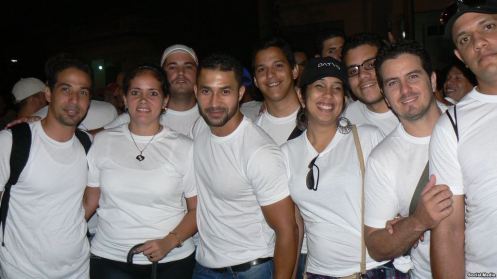
Juan Juan Almeida, 26 September 2017 — Developing Information and Communications Technologies as a strategic sector is an old premise for the Cuban government, but the migration of professionals to the non-state sector is the main enemy for the computerization and national cybersecurity program.
“Let’s say that structurally we can have control of the data that circulates in the different cellphone networks, cybercafes, wifi sites and the more than a million users who have access to the Internet through Nauta accounts [from ETECSA, the state telecommunications company]. We also work together with a group of attorneys to structure a legal and regulatory framework for navigation, that contains decrees and complementary rules according to the cybernecessity,” says a graduate of Jose Antonio Echeverria Technology Univeristy (CUJAE), speaking to Marti Noticias.
In 2015, the First Vice-President of Cuba’s Council of State and of Ministers, Miguel Díaz-Canel, announced the creation of the Council for Computerization and Cybersecurity, which would be subordinate to the country’s top management and fulfill the mission of coordinating and controlling policies and comprehensive strategies associated with the world of technologies, and that would put cybersecurity ahead of computerization.
Several institutions remain associated with this Council, whose mission is to safeguard integrity, independence and technological sovereignty; as well as to strengthen the presence and impact of the Cuban system in the social networks: The Computer Network Security Office (OSRI) is directly subordinated to the Ministry of Informatics and Communications.
The Computer Network Security Office (OSRI) is directly subordinated to the Ministry of Informatics and Communications.
“I am terrified of this group because they are very well equipped and like hunting dogs they can inspect and find even what you have erased.” says the source, one of those potentially chosen to be part of the Cuban delegations that will participate in the 19th World Youth and Students Festival, in the Russian city of Sochi.
DATYS is another group of programmers that belongs to the Ministry of the Intertior (MININT), and is responsible for manufacturing and selling software. This is the group that makes biometric programs for fingerprint recognition, it was this group that implemented the identification system in Venezuela, Bolivia, Nicaragua, Ecuador, among other countries.
SOFTEL is another small, strategic, vanguard community that offers advanced IT solutions, explains the interviewee. It has its headquarters within the University of Computer Science (UCI) and now is working on GalenLab, a software for the implementation of digital medical records.
The source referred to two systems created by SOFTEL: Galen Lab “Blood Bank,” to create blood banks and donor registries; and Galen Lab “Diagnostic Methods,” engaged with the process inside a laboratory that allows access to the exams of each patient of the Cuban medical system and of any of the medical missions of Cuba abroad.
SERTFOD is another group of young people dedicated to cybersecurity. It belongs to the Revolutionary Armed Forces (FAR) and since last July was authorized to provide services outside the FAR. Now it is in charge of repairing computer media, in addition to installing alarms and surveillance cameras in several civilian companies, and even in foreign companies. This group is in charge of managing the technology and methods that operate in a condition of secrecy or compartmentalization.
“The organization exists and is up and running; the problem is that our leaders belong to an age group that refuses to be a part of the digital age and that has sidelines the more than 25,000 professional experts in this area,” adds the source.
With low wages, poor working conditions, zero professional achievement, and the inability to negotiate patents and intellectual property, it is understandable that these specialists, skilled personnel with well-kept secrets, emigrate.
